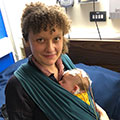Sleep in a time of COVID-19
-
Case study
- Health and Wellbeing
Posted on 9 September 2020
We are exploring how the pandemic is affecting the sleep and wellbeing of primary school children in the UK.

Poor sleep and poor mental health are interlinked. It’s vital that we understand how the COVID-19 pandemic may have affected the sleep and mental health of our children, and how best to support them during the next academic year.
The issue
Sleep is intimately linked with mental health for both adults and children. In children, poor sleep is associated with low mood and difficulty controlling emotions, as well as worse grades in school - partly as a result of not being able to concentrate. Not only can poor sleep cause mental health difficulties, it can also result from mental health difficulties such as anxiety and depression, even if they’re only experienced for a short time.
We also know that stress caused by issues such as surviving natural disasters can have an impact on sleep - and research has already shown that the COVID-19 pandemic is affecting both sleep behaviour and mental health in adults around the globe.
The research
The SleepSmart team in the Department of Psychology are studying how the current pandemic is affecting the sleep and wellbeing of primary school children across the UK. At the peak of infections over April and May the team circulated a questionnaire asking parents and children about anxiety levels and sleep patterns, as well as other behaviours that are thought to be linked to sleep, such as how much time children spend with screens and how much time they spend outside.
Initial results suggest that while children’s bedtimes and wake up times shifted later in the spring, total time asleep remained similar to pre-pandemic levels. Importantly, around 15 per cent of children showed an increase in anxiety levels at bedtime, linked to their own, and their parents’ anxiety about COVID-19. This change in pre-bed anxiety level predicts how long children now take to fall asleep at night, possibly suggesting children are worrying or ruminating after lights out.
The same families are now being re-contacted to assess their children’s sleep behaviour six months in, when UK infection rates are lower and schools are re-opening. While still just a snapshot of changes over the summer, this work should give the psychology team an idea of children’s wellbeing and sleep habits as they head back to the new school year. It will also provide valuable clues about how best to support children in similar circumstances in the future.
The project, funded as part of the SleepSmart grant by the Economic and Social Research Council, will be wrapped up and reported over the next few months.
This project supports ongoing research in the Sleep, Language and Memory (SLAM) lab, in the Department of Psychology, into the roles that sleep plays throughout the lifespan, from language learning to emotional processing.

Lisa Henderson
Dr Henderson’s research includes exploring the role of sleep in vocabulary acquisition and individual differences in this process across development.

Victoria Knowland
Dr Knowland’s research focuses on language development and sleep patterns over typical and atypical development.

Gareth Gaskell
Professor Gaskell’s research interests focus on the intersection between psycholinguistics, sleep and memory consolidation.

Elaine van Rijn
Dr van Rijn’s research interests include the relationship between sleep and memory consolidation as well as dreaming.
